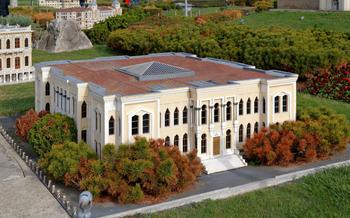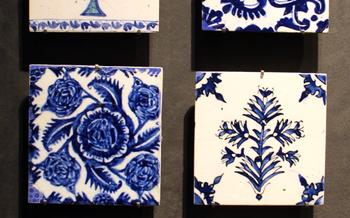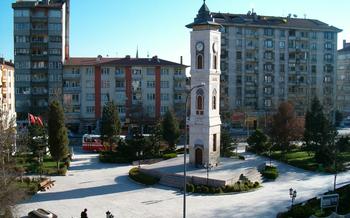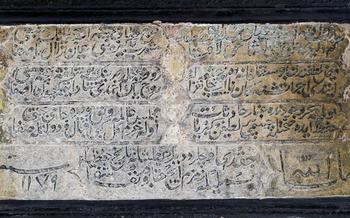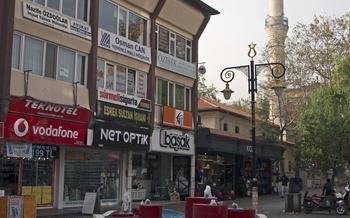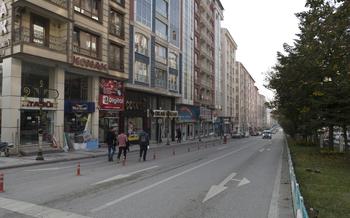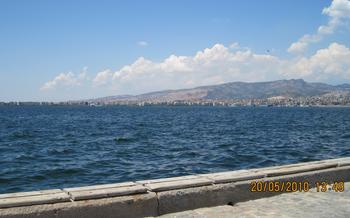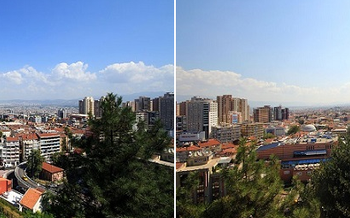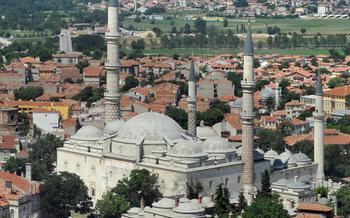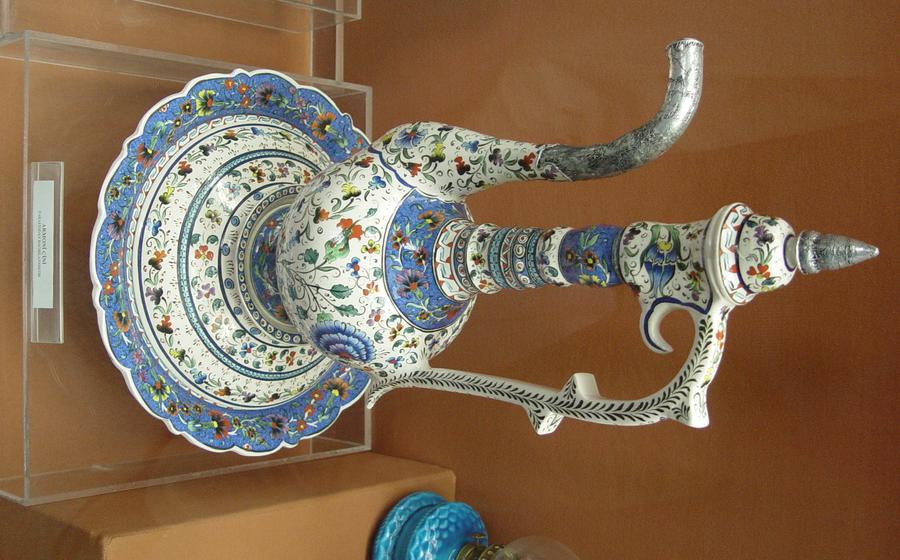
Çini Museum
- Historical Background
- Location and Accessibility
- Architectural Marvel
- Collection Highlights
- Interactive Exhibits
- Artisans' Workshops: Preserving Tradition and Inspiring Creativity
- Souvenir Shop: Preserving Tradition Through Authentic Keepsakes
- Cultural Events
- Guided Tours: Unveiling the Enriching Narratives of Çini Tiles
- Accessibility for All:
- Photography and Social Media
- Surrounding Attractions:
- Food and Beverages
- Insider Tip:
Historical Background
Kütahya, a city steeped in history and cultural heritage, has played a significant role in the development of Çini tile-making in Turkey. The ancient art of Çini, also known as Iznik tiles, originated in the Seljuk period when skilled artisans crafted exquisite tiles adorned with intricate patterns and vibrant colors. During the Ottoman era, Kütahya became a renowned center for Çini production. The city's artisans, influenced by the patronage of the Ottoman sultans, refined their techniques and created stunning tiles that adorned palaces, mosques, and other architectural marvels across the empire. The Çini tiles produced in Kütahya were not only decorative but also highly durable, able to withstand the test of time and retain their vibrant colors for centuries. Today, the Çini Museum in Kütahya stands as a testament to the city's rich history and its enduring legacy in the art of Çini tile-making.
Location and Accessibility
The Çini Museum is conveniently located in the heart of Kütahya, Turkey, making it easily accessible for visitors. It is situated on the Cumhuriyet Caddesi, near the city's main square and surrounded by historical landmarks and cultural attractions. The closest airport to Kütahya is the Zafer Airport, which is approximately 50 kilometers away. From the airport, visitors can take a taxi or rent a car to reach the museum.
Architectural Marvel
The Çini Museum is housed in a magnificent building that is a masterpiece of architecture in its own right. Constructed during the late Ottoman period, the building was originally a caravanserai, a traditional resting place for travelers and merchants along the Silk Road. Its imposing facade features intricate stone carvings, graceful arches, and decorative tilework, showcasing the architectural prowess of the era.
Inside, the museum's spacious halls and galleries are adorned with elegant vaulted ceilings, marble floors, and beautifully preserved Çini tiles. The central courtyard, once used as a stable for animals, has been transformed into a serene oasis, featuring a tranquil fountain and lush greenery. Visitors can wander through the museum, admiring the harmonious blend of Ottoman and Seljuk architectural styles that create a truly immersive experience.
Collection Highlights
The Çini Museum boasts a diverse collection of Çini tiles and artifacts that showcase the rich history and artistry of Kütahya's ceramic heritage. Visitors can marvel at the intricate designs, vibrant colors, and exceptional craftsmanship that characterize these exquisite tiles.
The museum houses a remarkable collection of blue and white tiles, which exemplify the classic style of Kütahya's Çini tradition. These tiles often feature intricate floral patterns, geometric motifs, and calligraphic inscriptions, demonstrating the skill and precision of the artisans who created them.
Another highlight of the collection is the impressive display of polychrome tiles, which showcase a wider range of colors and more complex designs. These tiles often depict scenes from daily life, mythology, or history, providing a glimpse into the cultural and artistic influences that shaped Kütahya's Çini tile-making.
Among the most notable pieces in the collection are the "Blue Mosque Tiles," which were originally created for the iconic Blue Mosque in Istanbul. These tiles feature a stunning cobalt blue glaze and intricate floral patterns, exemplifying the highest level of craftsmanship achieved by Kütahya's artisans.
Another must-see exhibit is the "Sultan's Palace Tiles," which were once part of the opulent Topkapi Palace in Istanbul. These tiles showcase elaborate designs and intricate patterns, reflecting the grandeur and luxury of the Ottoman court.
Interactive Exhibits
The Çini Museum provides an engaging and interactive experience for visitors of all ages through its innovative displays and exhibits. Interactive touchscreens showcase the history and evolution of Çini tiles, allowing visitors to explore the intricate designs and patterns in detail. Virtual reality experiences transport visitors to the bustling workshops of the past, where they can witness the artisans at work and learn about the techniques used to create these beautiful tiles. Hands-on activities, such as tile painting workshops and pottery classes, offer visitors a chance to create their own unique Çini pieces under the guidance of skilled artisans. These interactive elements not only enhance the visitor experience but also promote cultural engagement and foster a deeper appreciation for the art of Çini tile-making.
Artisans' Workshops: Preserving Tradition and Inspiring Creativity
The Çini Museum is not just a place to admire the exquisite works of art from the past; it's also a vibrant hub where visitors can witness the art of Çini tile-making in action. Within the museum's premises, several workshops and studios provide a unique opportunity to observe local artisans as they meticulously create Çini tiles using traditional techniques. These workshops are not merely demonstrations; they are living testaments to the enduring legacy of Çini tile-making in Kütahya.
The artisans, with their nimble fingers and years of experience, deftly mold and paint the clay, transforming it into intricate and colorful masterpieces. Visitors can watch as they carefully select the finest materials, including clay, glazes, and pigments, and then witness the transformation of these humble elements into stunning works of art. The workshops offer a glimpse into the intricate processes involved in Çini tile-making, from the initial sketching and designing to the glazing and firing stages.
By preserving and promoting the art of Çini tile-making, these workshops play a vital role in safeguarding an important part of Turkish cultural heritage. They provide a platform for skilled artisans to showcase their talent and pass on their knowledge to future generations. Visitors to the Çini Museum are not just passive observers; they become part of a living tradition, gaining a deeper appreciation for the artistry and craftsmanship that go into each Çini tile.
For those who want to take their experience a step further, the museum offers workshops and classes where visitors can try their hand at creating their own Çini tiles under the guidance of experienced artisans. These hands-on experiences provide a unique opportunity to learn about the techniques and processes involved in Çini tile-making and create a personalized souvenir to cherish.
Souvenir Shop: Preserving Tradition Through Authentic Keepsakes
The Çini Museum's gift shop is a treasure trove of unique souvenirs and mementos that allow visitors to take a piece of Kütahya's rich cultural heritage home with them. Here, you'll find an array of handmade Çini tiles, meticulously crafted by local artisans using traditional techniques. These tiles, adorned with vibrant colors and intricate patterns, make for beautiful decorative pieces or thoughtful gifts for loved ones.
In addition to tiles, the gift shop offers a wide selection of pottery, jewelry, and other handcrafted items that showcase the exceptional artistry of Kütahya's craftsmen. These souvenirs are not only beautiful but also serve as a tangible reminder of the region's cultural traditions. By purchasing authentic souvenirs, visitors directly support local artisans and help preserve the centuries-old art of Çini tile-making.
Whether you're looking for a unique souvenir to commemorate your visit to the Çini Museum or a special gift for someone back home, the museum's gift shop has something for everyone. Embrace the opportunity to support local artisans while immersing yourself in the vibrant culture of Kütahya.
Cultural Events
The Çini Museum is not just a repository of exquisite Çini tiles; it is also a vibrant cultural hub that hosts a variety of special events, workshops, and exhibitions throughout the year. These events are designed to promote cultural exchange, foster a sense of community, and provide visitors with unique and immersive experiences.
From traditional Çini tile-making workshops to contemporary art exhibitions, the museum offers a diverse range of events that cater to different interests and age groups. Visitors can learn about the ancient art of Çini tile-making from local artisans, participate in hands-on workshops, and admire the works of renowned artists and designers.
These events provide an excellent opportunity for visitors to not only learn more about Çini tiles but also to engage with the local community, share ideas, and foster a deeper appreciation for Turkish culture and heritage.
By participating in these cultural events, visitors can become part of a vibrant community of artists, historians, and enthusiasts who share a passion for preserving and celebrating the art of Çini tile-making.
Guided Tours: Unveiling the Enriching Narratives of Çini Tiles
Enhance your visit to the Çini Museum by embarking on a guided tour led by knowledgeable and experienced museum guides. These passionate storytellers will take you on a journey through time, delving into the captivating history, intricate techniques, and profound significance of Çini tiles. With their expertise, they will unravel the tales behind each tile, shedding light on the cultural, artistic, and societal influences that shaped their creation.
Join a guided tour to gain deeper insights into the symbolism and motifs depicted on the tiles, exploring their connections to Islamic art, Ottoman history, and Turkish traditions. Learn about the painstaking craftsmanship involved in creating these ceramic masterpieces, from the selection of raw materials to the meticulous firing process. Discover the stories of the master artisans who dedicated their lives to preserving this unique art form, passing down their skills and knowledge from generation to generation.
Whether you're a history buff, an art enthusiast, or simply curious about Turkish culture, the Çini Museum's guided tours offer an immersive and enriching experience. Let the museum's expert guides be your companions as you traverse the fascinating world of Çini tiles, leaving you with a newfound appreciation for their beauty, craftsmanship, and enduring legacy.
Accessibility for All:
The Çini Museum is committed to ensuring that its facilities and exhibits are accessible to all visitors, regardless of their abilities. The museum features ramps and elevators to provide easy access to all floors, making it convenient for visitors with mobility impairments to navigate the museum's spaces. Additionally, audio guides are available for the visually impaired, allowing them to experience the museum's collection in a meaningful way. The museum's dedication to inclusivity ensures that everyone has the opportunity to learn about and appreciate the rich cultural heritage of Çini tile-making in Kütahya.
Photography and Social Media
The Çini Museum welcomes visitors to capture the beauty of its exhibits through photography. However, to ensure the preservation of the artifacts and a respectful environment for all visitors, certain guidelines must be followed. Flash photography is strictly prohibited, as it can damage the delicate tiles and colors. Tripods and selfie sticks are also not permitted, as they can obstruct the flow of visitors and disrupt the overall museum experience.
Sharing your experiences on social media is encouraged, as it helps promote the museum and its mission. Visitors are free to share their photographs and impressions on platforms like Instagram, Facebook, or Twitter. By using the museum's official hashtags or tagging the museum's social media accounts, you can connect with other visitors, share your love for Çini tiles, and inspire others to explore this cultural treasure.
Surrounding Attractions:
Complement your visit to the Çini Museum with a journey to nearby attractions that immerse you in the rich history and natural beauty of Kütahya. Explore the well-preserved Ottoman architecture of the city center, where historic mosques, caravansaries, and traditional Turkish houses line the charming streets. Step back in time at the Kütahya Castle, a magnificent fortress that offers panoramic views of the city and the surrounding countryside. For a serene escape, venture to the nearby Porsuk River, where you can unwind amidst picturesque landscapes and indulge in outdoor activities such as fishing, boating, or simply soaking in the tranquil ambiance. History enthusiasts should not miss the opportunity to visit the nearby Afyonkarahisar, home to the Phrygian Valley and the ancient city of Hierapolis, a UNESCO World Heritage Site. With its well-preserved Roman ruins, thermal springs, and stunning natural surroundings, Afyonkarahisar offers a glimpse into the region's rich past.
Food and Beverages
Indulge in the culinary delights of Kütahya after your enriching visit to the Çini Museum. The city offers a tantalizing array of restaurants, cafes, and traditional Turkish food establishments that are sure to satisfy your taste buds. Savor the flavors of local specialties such as "mantı," tender dumplings served with garlic yogurt sauce, or "gözleme," a savory pastry filled with cheese, spinach, or minced meat. For a sweet treat, try the famous "künefe," a crispy shredded filo dough dessert drenched in sweet syrup and topped with melted cheese. Vegetarian and vegan-friendly options are also available in many establishments, ensuring a delightful dining experience for all visitors.
Insider Tip:
Seek out the hidden courtyard garden nestled within the Çini Museum. This serene oasis, often overlooked by visitors, offers a tranquil retreat from the bustling museum halls. Admire the vibrant colors of the Çini tiles adorning the walls and soak in the peaceful ambiance as you relax and reflect on the beauty of this ancient art form. This hidden gem is a perfect spot to capture some stunning photos and escape the crowds, allowing you to fully immerse yourself in the tranquility and beauty of Kütahya's rich cultural heritage.
